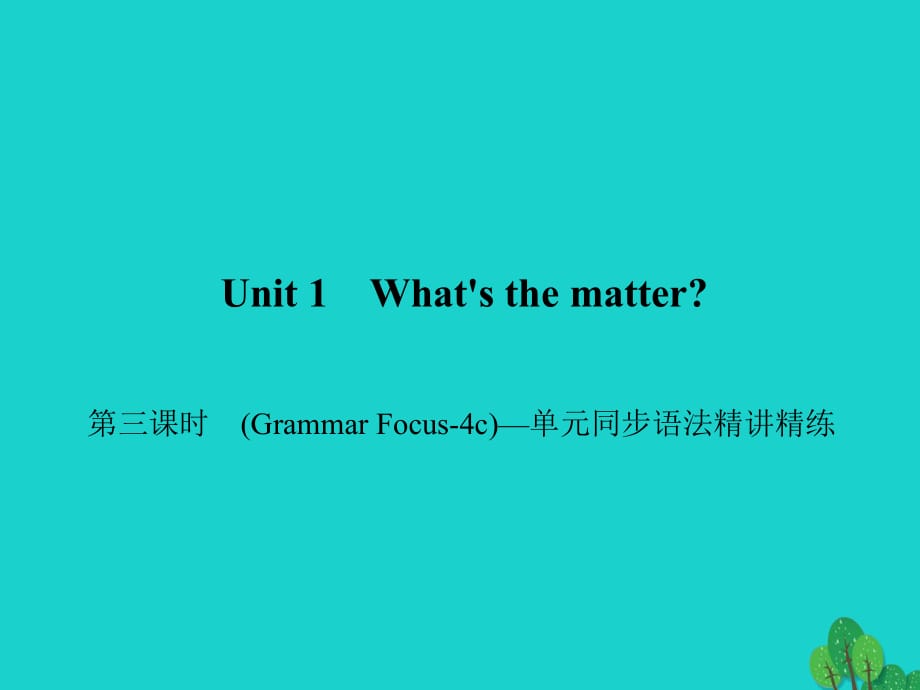《八年級(jí)英語(yǔ)下冊(cè) Unit 1 What's the matter(第3課時(shí))(Grammar Focus-4c)同步語(yǔ)法精講精練課件 (新版)人教新目標(biāo)版1》由會(huì)員分享��,可在線(xiàn)閱讀����,更多相關(guān)《八年級(jí)英語(yǔ)下冊(cè) Unit 1 What's the matter(第3課時(shí))(Grammar Focus-4c)同步語(yǔ)法精講精練課件 (新版)人教新目標(biāo)版1(8頁(yè)珍藏版)》請(qǐng)?jiān)谘b配圖網(wǎng)上搜索。
1��、Unit 1Whats the matter?第三課時(shí)(Grammar Focus4c)單元同步語(yǔ)法精講精練 1詢(xún)問(wèn)某人患了何種疾病或遇到了何種麻煩時(shí),常用以下幾種結(jié)構(gòu)來(lái)表達(dá):Whats the matter (with sb.)����?(某人)怎么了?Whats wrong (with sb.)�?(某人)怎么了?Whats the trouble (with sb.)�����?(某人)出什么事了�?What happened (to sb.)?(某人)發(fā)生了什么事�����?Are you OK��?你沒(méi)事吧���?2要表達(dá)身體疼痛或不舒服��,可用以下結(jié)構(gòu):某人have/has病癥�����。eg:The twins have colds
2�、.雙胞胎感冒了。 某人have/hasa身體部位ache�����。eg:She had a stomachache last night.她昨晚肚子痛��。某人have/hasasore發(fā)病部位����。eg:He has a sore throat.他喉嚨痛。某人hurt(s)身體部位或反身代詞���。eg:He hurt his leg.他的腿受傷了�。身體部位hurt(s)eg:My head hurts badly.我頭疼得厲害���。There is something wrong with ones身體部位。eg:There is something wrong with my right eye.我的右眼有毛病��。
3��、 1 should為情態(tài)動(dòng)詞,意為“應(yīng)該�����;應(yīng)當(dāng)”��,否定式為shouldnt��,其后接動(dòng)詞原形��,無(wú)人稱(chēng)和數(shù)的變化����。常用于表達(dá)征詢(xún)意見(jiàn)、建議��、勸告����、要求或義務(wù)等。eg:You should drink hot water with honey.你應(yīng)該喝加有蜂蜜的開(kāi)水���。2 should用于主語(yǔ)為第一人稱(chēng)的疑問(wèn)句�,表示征詢(xún)意見(jiàn)��。eg:Should I put some medicine on it?我應(yīng)當(dāng)給它敷上藥嗎���?Should we tell her about it����?我們應(yīng)該告訴她這件事嗎�����? 1反身代詞的構(gòu)成人稱(chēng)數(shù)第一人稱(chēng)第二人稱(chēng)第三人稱(chēng)單數(shù)myself我自己yourself你自己himself/
4���、herself/itself他/她/它自己復(fù)數(shù)ourselves我們自己yourselves你們自己themselves他/她/它們自己 2.反身代詞的用法(1)作同位語(yǔ)����,起強(qiáng)調(diào)作用�����。既可作主語(yǔ)同位語(yǔ)�,又可作賓語(yǔ)同位語(yǔ)。eg:I myself can work out this problem.I can work out this problem myself.我自己能解決這個(gè)問(wèn)題���。You must give the message to your brother himself.你必須把這條消息給你哥哥本人�����。(2)作賓語(yǔ)��,起反射作用�。指主語(yǔ)發(fā)出的動(dòng)作反射回主語(yǔ)本身���。eg:They taug
5�����、ht themselves English.他們自學(xué)英語(yǔ)��。You must learn to look after yourselves.你們必須學(xué)會(huì)照顧自己���。 一、用所給單詞的適當(dāng)形式填空����。1 My brother _(have) a high fever now.He should _(go) to a doctor.2 Did you hurt _(you) in the mountain yesterday?No.We enjoyed _(us) though we felt tired.3 The old man had problems breathing.What should
6、we do _(help) him?4 Li Juan hurt _(she) when she played tennis yesterday afternoon.5“Youre old enough�, boy.Youd better do it _(you),” my father said to me. hasgo yourself/yourselvesourselves to helpherself yourself 二��、按要求完成下列句子。6 I have a sore back.(改為一般疑問(wèn)句)_ a sore back?7 I should put some sugar into the tea.(改為否定句)I _ any sugar into the tea.8 Should I take Mary to see the doctor�����?(補(bǔ)全否定回答)No����, _9 Bens brother should take_singing_lessons(對(duì)畫(huà)線(xiàn)部分提問(wèn))_ Bens brother_?10 Alices cousin has_the_flu(對(duì)畫(huà)線(xiàn)部分提問(wèn))_ Alices cousin?Do you haveshouldnt putyou shouldntWhat should doWhats the matter/trouble with
 八年級(jí)英語(yǔ)下冊(cè) Unit 1 What's the matter(第3課時(shí))(Grammar Focus-4c)同步語(yǔ)法精講精練課件 (新版)人教新目標(biāo)版1
八年級(jí)英語(yǔ)下冊(cè) Unit 1 What's the matter(第3課時(shí))(Grammar Focus-4c)同步語(yǔ)法精講精練課件 (新版)人教新目標(biāo)版1

